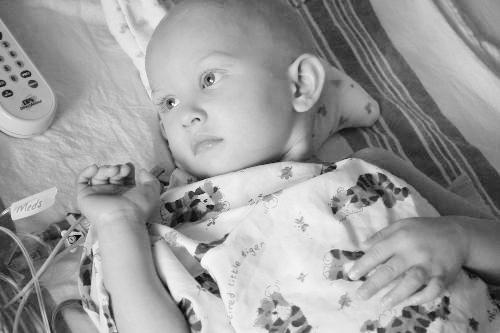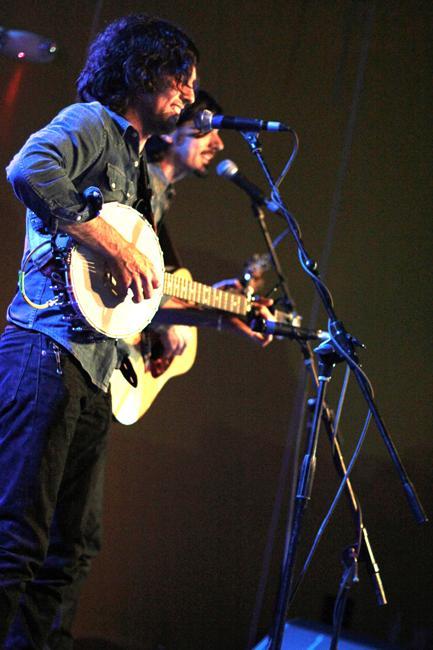In late Feb. 2011, Jedidiah Gant was giving his friend, Grayson Currin , a ride home with his one-and-a-half-year-old son, Oliver, in the back seat. Oliver had been crying for the past hour, showing signs of distress-which had happened repeatedly for the past week. Anytime he was strapped into something like a car seat or stroller that pressed on his abdomen, the crying began.
After dropping off Currin , Jed and his wife, Stacy, took Oliver to WakeMed hospital. After many tests, a CT scan finally showed his bladder was distended, and a large tumor was growing off of his tail bone and pinching off his bladder.
It was an all-day affair, as Jed recalls it. As soon as the couple received the news, doctors gave Oliver a catheter, drained his bladder and sent them immediately to the cancer department at the N.C. Children’s Hospital.
“The first few weeks were a blur, but the day and night he was diagnosed are clear as day,” Jed said. “We packed our stuff and got over there; the first step at Chapel Hill was to do some blood tests, and they wanted to get a biopsy of the tumor.”
Before discussing treatment, the doctors needed a technical diagnosis. During the preliminary stages, doctors gave Oliver a bioport , a port inserted in the chest that delivers medications and IV fluids directly into the heart and blood system.
One year ago, Jed and Stacy never expected to witness 1,700 people racing for tickets to a benefit concert for their son, with the Avett Brothers and the Love Language headlining. One year ago, the Gants didn’t know what to expect after one abrupt visit to the hospital.
An innocent victim, a sobering diagnosis
Oliver was finally diagnosed with malignant coccygeal teratoma on Feb. 25, 2011, after an all-day and night affair in WakeMed and UNC hospitals. The tumor, growing off of his tailbone, is a type of germ cell tumor, like ovarian or testicular cancer and metastasizes in the same biological manner. Upon diagnosis, doctors measured Oliver’s Alpha-fetoprotein (AFP) levels. Doctors use AFP as a biomarker to detect a subset of tumors in non-pregnant women, men and children. A blood level of more than 500 nanograms per milliliter of AFP can be indicative of germ cell tumors and other types of cancer.
Oliver’s AFP level was 39,000 when diagnosed, and thus Jed and Stacy started evaluating treatment options immediately.
“We went back and forth [between the options]…but there’s a [medical] protocol attached to the type of tumor he has,” Jed said. “It was four rounds of chemotherapy, a surgery and then two more rounds of chemotherapy. So the goal was to see that out and then go from there.”
Oliver had his first surgery of this treatment session in June 2011, and then completed the last two rounds of chemotherapy in July 2011. His AFP levels were measured, and had not returned to normal. Instead, the levels rose, indicating Oliver had relapsed.
“[The relapse] meant that he had become resistant to one or more of the chemo drugs … so he started treatment again in October 2011,” Jed said.
This would include two rounds of a stronger chemotherapy, a second surgery and two following rounds of chemo. The Gants took Oliver to New York for his second surgery in December 2011 and, according to Jed, “it went as well as it could go.”
“The margins of his surgery were clear, so they think they got everything,” Jed said.
Taking baby steps
Now, Oliver’s AFP levels are hovering within the normal range, and he finished his last round of chemotherapy a month ago.
“Right now he’s on ‘off-treatment,'” Jed said. “He’s not in remission, because it hasn’t been far enough out of treatment to consider it remission.”
Since completing treatment, Oliver has been improving significantly. It’s been 13 months since his initial diagnosis.
“He’s doing fantastic; he’s acting the way we assume a two-and-a-half-year-old acts,” Jed said. “He’s full of energy, he’s eating a lot of food-both of which we haven’t seen a lot of in the past year, because chemo takes the energy and appetite out of you.”
Jed said the family’s plans are now at a degree of normalcy. As a graduate student at N.C. State in art and design with a concentration in animation, Jed has been able to return to school. He’s also been able to continue his position as editor of his news blog, New Raleigh.
Before Oliver’s birth in June 2009, the couple hoped for a healthy baby, and forewent knowing the sex of the child. They decorated his room with a “middle-of-the-road” kind of mindset, according to Jed.
“Never in a million years do you expect something like this to happen to you, especially when you have your first child,” Stacy said. “But he’s doing so great now, and we’re so glad.”
Despite Oliver’s improving health and his family’s relief, medical bills have become a daunting issue. Stacy’s medical insurance only covers a percentage of the costs, and the family is required to pay $10,000 to $15,000 a year out of pocket.
Many of Jed’s friends in the downtown art scene have organized small benefit concerts and auctions in Oliver’s name to help raise money for the family. Grayson Currin , music editor for the Independent Weekly and co-director of the paper’s Hopscotch Music Festival, felt he needed to organize something bigger to help out.
“I just got into the family,” Currin said. “I remember Oliver being born, and his wife Stacy is an awesome person, so we just became friends.”
Currin remembers being in the car just hours before Oliver was diagnosed.
“Learning my friend’s son had cancer was a pretty big realization, and a pretty hard moment,” Currin said. So, he decided to organize a mini-Hopscotch festival to raise money for the family. “The more you work in music, the more you get to know musicians as people…So I simply asked [different bands] if they would do a show for free.”
A secret worth sharing
Currin organized a mini-music festival with 21 bands across four venues in downtown Raleigh. The festival, Racing the Cure, was scheduled for Friday, March 23, and 1,700 tickets were sold, raising a total of $40,000.
Currin kept the event a secret to Jed, and after it was released to the public, Jed said he wanted to be just as surprised as everyone else.
Jed had been close friends with the Avett Brothers since college, and knew some of the other bands through his work at New Raleigh and his friendship with Currin . Jed and Stacy attended the event and watched each band from backstage.
Throughout the benefit, sentimental phrases such as “Let’s hear it for Oliver,” or “This one goes out to Oliver,” were common openings to each band’s set list. Bands had unique reasons for agreeing to play, whether it was a close tie to the Gants or having a loved one affected by cancer.
“This is what happens when musicians get together to help out a cause,” Renee Mendoza, lead singer of FilthyBird , said. Though Mendoza didn’t know the Gants personally, she could not say no to saving a child’s life after receiving Currin’s invitation. “Playing for a benefit show that is truly for a good cause alleviates some of the normal music festival stress,” Mendoza said. “[The bands] aren’t trying to out-do each other … we are playing to play.”
Danny Johnson from Jack the Radio said everyone in the local music community knows Jed and thus had heard about Oliver.
“New Raleigh has always really supported Jack the Radio, so we immediately stepped up to support [Jed] when he needed it,” Johnson said.
Though Johnson and Jack the Radio had been involved in the early planning of a benefit for Oliver, they had no idea it would reach the size it did.
Thanks to the size and publication of the event, the money raised will cover everything the Gants need. They are also donating a percentage of the proceeds they don’t need to Caring Bridge, an online social network for cancer patients and kids with health issues.
“I think [Racing the Cure] was a good example of the idea of…the community coming together, and helping each other out,” Jed said. “This [experience] makes me want to do more advocacy in future … toward pediatric cancer.”
Now Oliver plays doctor while at home. Jed said it’s strange for a two-year-old to pretend to give people shots and take their blood pressure. But many things haven’t been normal for Oliver’s childhood. Before he reached two, he went through chemotherapy commonly administered to adults, causing him to grow up in a way, according to Jed.
“I think he’s shown a certain kind of intellectual or adult nature, he knows he has to do it, and he senses that it’s a good thing to do this and it makes him feel better,” Jed said.
Oliver doesn’t cry in his car seat anymore. Since his diagnosis 13 months ago, he has recovered, and his behavior is that of an affectionate, innocent kid-he stumbles through his ABCs, plays with Legos and loves the trains at Pullen Park. Though things are still uncertain, Jed said his family has come to appreciate what they have.
”Our goal is to just travel and get back to what we used to do,” Jed said. “We want to show him the world … and just be a family.”
Seth and Scott Avett of the Avett Brothers headline the 16-band benefit concert for Oliver Gant, Racing the Cure, on Friday, March 23. The brothers went to college with Oliver Gant's father and were happy to come out and support the cause. Photo by Katherine Hoke









